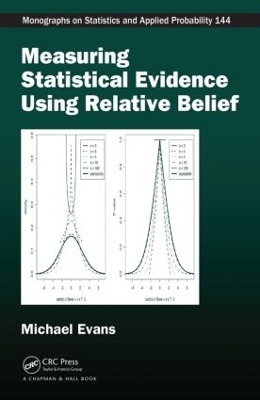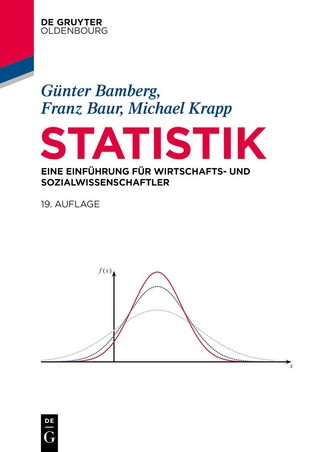
Measuring Statistical Evidence Using Relative Belief
Seiten
2015
Chapman & Hall/CRC (Verlag)
978-1-4822-4279-9 (ISBN)
Chapman & Hall/CRC (Verlag)
978-1-4822-4279-9 (ISBN)
A Sound Basis for the Theory of Statistical Inference
Measuring Statistical Evidence Using Relative Belief provides an overview of recent work on developing a theory of statistical inference based on measuring statistical evidence. It shows that being explicit about how to measure statistical evidence allows you to answer the basic question of when a statistical analysis is correct.
The book attempts to establish a gold standard for how a statistical analysis should proceed. It first introduces basic features of the overall approach, such as the roles of subjectivity, objectivity, infinity, and utility in statistical analyses. It next discusses the meaning of probability and the various positions taken on probability. The author then focuses on the definition of statistical evidence and how it should be measured. He presents a method for measuring statistical evidence and develops a theory of inference based on this method. He also discusses how statisticians should choose the ingredients for a statistical problem and how these choices are to be checked for their relevance in an application.
Measuring Statistical Evidence Using Relative Belief provides an overview of recent work on developing a theory of statistical inference based on measuring statistical evidence. It shows that being explicit about how to measure statistical evidence allows you to answer the basic question of when a statistical analysis is correct.
The book attempts to establish a gold standard for how a statistical analysis should proceed. It first introduces basic features of the overall approach, such as the roles of subjectivity, objectivity, infinity, and utility in statistical analyses. It next discusses the meaning of probability and the various positions taken on probability. The author then focuses on the definition of statistical evidence and how it should be measured. He presents a method for measuring statistical evidence and develops a theory of inference based on this method. He also discusses how statisticians should choose the ingredients for a statistical problem and how these choices are to be checked for their relevance in an application.
Michael Evans is a professor in the Department of Statistics at the University of Toronto. His research focuses on statistical inference, particularly a theory of inference based on the concept of relative belief. He is an associate editor of Bayesian Analysis and a former president of the Statistical Society of Canada.
Statistical Problems. Probability. Characterizing Statistical Evidence. Measuring Statistical Evidence Using Relative Belief. Choosing and Checking the Model and Prior. Conclusions. Appendix. Bibliography. Index.
| Reihe/Serie | Chapman & Hall/CRC Monographs on Statistics and Applied Probability |
|---|---|
| Zusatzinfo | 10 Tables, black and white; 8 Illustrations, black and white |
| Sprache | englisch |
| Maße | 178 x 254 mm |
| Gewicht | 526 g |
| Themenwelt | Geisteswissenschaften ► Psychologie |
| Mathematik / Informatik ► Mathematik ► Statistik | |
| Naturwissenschaften ► Biologie | |
| ISBN-10 | 1-4822-4279-6 / 1482242796 |
| ISBN-13 | 978-1-4822-4279-9 / 9781482242799 |
| Zustand | Neuware |
| Haben Sie eine Frage zum Produkt? |
Mehr entdecken
aus dem Bereich
aus dem Bereich
Eine Einführung für Wirtschafts- und Sozialwissenschaftler
Buch | Softcover (2022)
De Gruyter Oldenbourg (Verlag)
CHF 41,90


